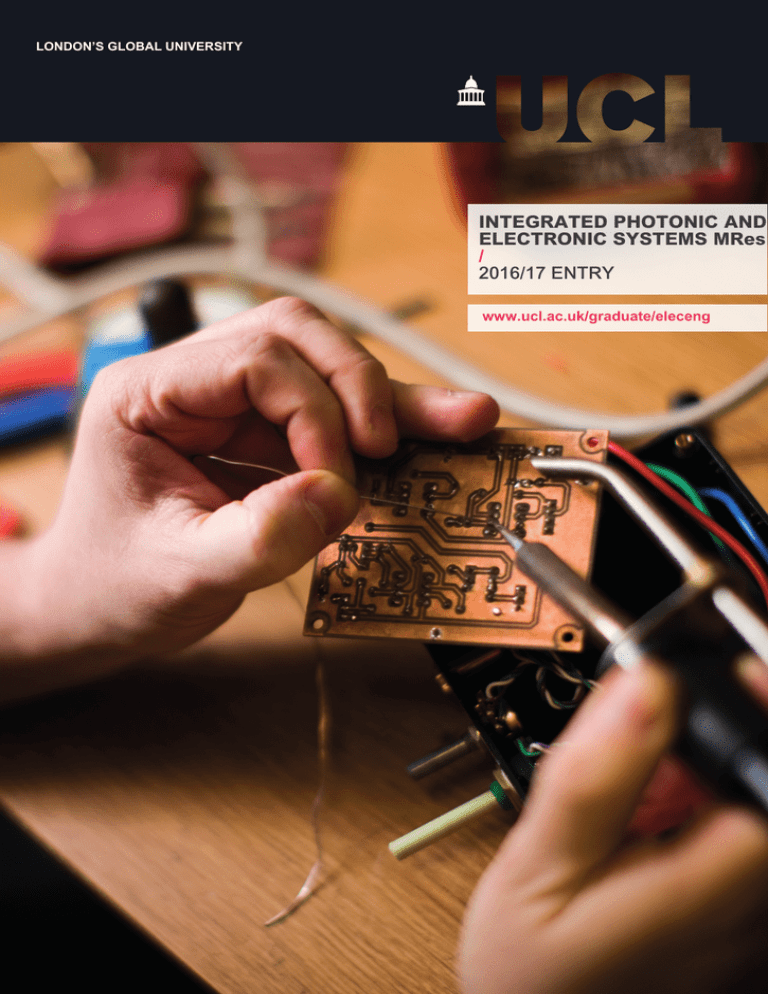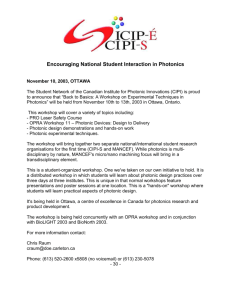INTEGRATED PHOTONIC AND ELECTRONIC SYSTEMS MRes / 2016/17 ENTRY
advertisement

LONDON’S GLOBAL UNIVERSITY INTEGRATED PHOTONIC AND ELECTRONIC SYSTEMS MRes / 2016/17 ENTRY www.ucl.ac.uk/graduate/eleceng Integrated Photonic and Electronic Systems MRes / The Integrated Photonic and Electronic Systems MRes, taught at the University of Cambridge and at the UCL Centre for Doctoral Training in Integrated Photonic and Electronic Systems, aims to train students to PhD level in the skills needed to produce new integrated photonic systems for applications ranging from information display to ultra-fast communications and industrial materials processing. Degree summary The programme offers a wide range of specialised modules, including electronics and biotechnology. Students gain a foundation training in the scientific basis of photonics and systems, and develop a good understanding of the industry. They are able to design an individual bespoke programme to reflect their prior experience and future interests. // // // The University of Cambridge and UCL have recently established an exciting Centre for Doctoral Training (CDT) in Integrated Photonic and Electronic Systems, leveraging their current strong collaborations in research and innovation. The centre provides doctoral training using expertise drawn from a range of disciplines, and collaborates closely with a wide range of UK industries, using innovative teaching and learning techniques. This centre, aims to create graduates with the skills and confidence able to drive future technology research, development and exploitation, as photonics becomes fully embedded in electronics-based systems applications ranging from communications to sensing, industrial manufacture and biomedicine. The programme is delivered through a combination of lectures, tutorials, projects, seminars, and laboratory work. Student performance is assessed through unseen written examination and coursework (written assignments and design work). Degree structure Mode: Full-time: 1 year Students undertake modules to the value of 180 credits. The programme consists of three optional modules (15 credits), two compulsory research projects (90 credits), one transferrable skills module (15 credits), three optional modules (45 credits) and two elective modules (30 credits). Project Report 1 at either UCL or Cambridge Project Report 2 at either UCL, Cambridge or industry Transferable Business Skills OPTIONS // Students choose three optional modules from the following: // Nanotechnology // Biosensors // Advanced Photonic Devices // Photonic Systems // Solar-Electrical Power: Generation and Distribution // Photonic Sub-systems // Broadband Technologies and Components ELECTIVE // Students choose a further two elective modules from the list below: // Solid State Devices and Chemical/Biological Sensors // Display Technology // Analogue Integrated Circuits // Robust and Nonlinear Systems and Control // Digital Filters and Spectrum Estimation // Image Processing and Image Coding // Computer Vision and Robotics // Materials and Processes for Microsystems // Building an Internet Router // Network Architecture // Software for Network Services // Optical Transmission and Networks // Nanotechnology and Healthcare DISSERTATION/REPORT // All students undertake two research projects. An independent research project (45 credits) and an industry focused project (45 credits). Your career Dramatic progress has been made in the past few years in the field of photonic technologies. These advances have set the scene for a major change in commercialisation activity where photonics and electronics will converge in a wide range of information, sensing, display, and personal healthcare systems. Importantly, photonics will become a fundamental underpinning technology for a much greater range of companies outside the conventional photonics arena, who will in turn require those skilled in photonic systems to have a much greater degree of interdisciplinary training, and indeed be expert in certain fields outside photonics. Employability Our students are highly employable and have the opportunity to gain industry experience during their MRes year in large aerospace companies like Qioptiq, BAE Systems, Selex ES; medical equipment companies such as Hitachi; and technology and communications companies such as Toshiba through placements based both in the UK and overseas. Several smaller spin-out companies from both UCL and Cambridge also offer projects. The Centre organises industry day events which provide an excellent opportunity to network with senior technologists and managers interested in recruiting photonics engineers. A recent 2014 graduate is now working as a Fiber Laser Development Engineer for Coherent Scotland. Another is a Patent Attorney for HGF Ltd. Entry requirements Normally a minimum of an upper second-class Bachelor's degree in a relevant discipline from a UK university or an overseas qualification of an equivalent standard. FEES AND FUNDING // UK & EU (2016/17) entry: £4,770 (FT) // Overseas (2016/17) entry: £22,180 (FT) English language proficiency level A number of competitive EPSRC studentships are normally available for candidates liable to pay fees at the UK/EU rate. If your education has not been conducted in the English language, you will be expected to demonstrate evidence of an adequate level of English proficiency. The Institution of Engineering and Technology also awards competitive scholarships for postgraduate study; for further details please visit www.theiet.org The level of English language proficiency for this programme is: Standard. Full details of funding opportunities can be found on the UCL Scholarships website: www.ucl.ac.uk/scholarships Information about the evidence required, acceptable qualifications and test providers is provided at: www.ucl.ac.uk/graduate/english-requirements CONTACT Your application We accept applications from November for the following academic year, and students are advised to apply as early as possible due to competition for places. We expect competition for places and funding to be highly competitive and all potential applicants should submit the pre-application screening form, available at: www.photonicsystems.org/join/preapplyform. Please note that this does not constitute a formal application. Following initial consideration of your pre-application, successful candidates will be invited to make a formal application to the University of Cambridge or UCL using the standard application form. Details on how to apply are available on the website at: www.ucl.ac.uk/graduate/apply PDF Updated: May 25, 2016 Information correct at time of going to press. See website (www.ee.ucl.ac.uk/) for latest information Electronic Engineering Email: mscenquiries@ee.ucl.ac.uk Telephone: +44 (0)20 7679 7300


